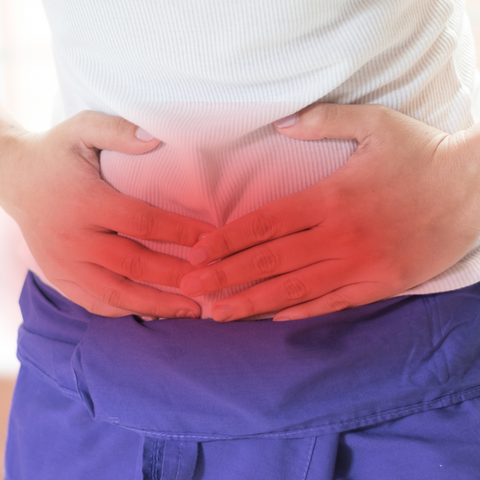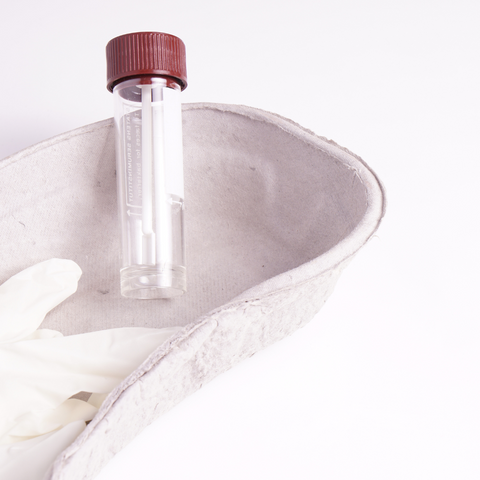What is IBS?
Irritable Bowel Syndrome (IBS) is a chronic condition that commonly affects the digestive system. You have to remember that IBS is not a disease, but a syndrome.
Did you know that 11.2% of the worldwide population is diagnosed with irritable bowel syndrome? In the United States, around 12% of the overall population is living with this syndrome.
Have you been recently diagnosed with IBS? Then you might be looking for more answers, cures, and ways how to manage your symptoms, you are on the right track!
What is IBS?

Irritable Bowel Syndrome (IBS) is a disorder that affects the large intestine. This syndrome is more than just pain in your digestive tract and changes in your bowel movements.
IBS can be a chronic condition, but there are treatments available to help manage symptoms. It is also important to know that IBS is very unpredictable. All the signs and symptoms that we will be discussing all throughout this article may or may not happen to you.
There is a strong link between IBS and colon health. IBS is a condition that affects the large intestine, and the colon is a part of the large intestine.
IBS can cause a variety of symptoms, including abdominal pain, cramping, bloating, gas, diarrhea, changes in bowel habits, and constipation. These symptoms can be very uncomfortable and can interfere with a person's quality of life.

Important Things To Know About IBS
If you have been informed by your doctor that you have IBS, these are the important things that you need to know regarding your syndrome:
1. IBS Symptoms May Vary From One Person to Another
We have mentioned that IBS symptoms may or may not occur to you since it varies from one person to another.
On the other hand, it is crucial to know the most common symptoms that may happen to you and how to manage them effectively.
Common Symptoms of IBS:
-
Cramping
-
Sharp abdominal pain
-
Bloating
-
Distention
-
Fullness
-
Flatulence
-
Changes in bowel movements
Other Symptoms:
-
Lethargy (lack of energy)
-
Heartburn
-
Always feeling sick
-
Muscle pains
-
Dizziness
-
Painful menstruation
When Should I See A Doctor?

You should pay a visit to your doctor if you are noticing continuous changes in your bowel habits, or if you feel like your symptoms are getting worse.
These may indicate other diseases or more serious conditions like digestive and kidney diseases that need to be medically treated as soon as possible. Here are some of the symptoms that you need to take note of:
-
Frequent diarrhea especially at night
-
Rectal bleeding
-
Severe weight loss
-
Anemia
-
Frequent vomiting and nausea
2. Exact Causes of IBS Are Unknown
Until today, there are no reported exact causes of IBS, and experts concluded that irritable bowel syndrome may be a combination of various digestive issues like the following:

-
Stress during early stages of life.
IBS patients who suffered from emotional stress during their childhood are reported to be more prone to the syndrome. The stressors include physical and/or sexual abuse during the early stages of life.
-
Small Intestinal Bacterial Overgrowth (SIBO).
The increase in the number of bacteria in your small intestine can cause irritation in your digestive system.
-
Mental health issues
Certain mental health issues like anxiety, depression, and somatic symptom disorder can trigger irritable bowel syndrome (IBS).
-
Genetics
Research has also shown that genetics play a role in the development of IBS. If your family has a history of IBS, then you are also more likely to inherit the symptoms during your adult life.
-
Food intolerance
There are individuals who are having sensitivities and intolerances to certain food items because they have more sensitive colons than other people. These issues can also cause or lead to Irritable Bowel Syndrome.
What Can Trigger Irritable Bowel Syndrome (IBS)?
Now that we know the most common causes of IBS, it is time to know what may trigger the symptoms.
These triggers are highly recommended to be avoided in order to easily manage your symptoms. By knowing your triggers, you have more opportunities in managing your IBS symptoms in a more efficient manner - leading to overall health improvement.
Take note of the common triggers of Irritable Bowel Syndrome:
Food

Food is the main trigger for IBS, and there are certain food items that you need to take note of like the following:
-
Refined breads and cereals
-
Processed foods
-
Coffee, alcohol, and carbonated drinks
-
Dairy products
IBS patients are usually prescribed to follow a Low FODMAP diet. The low FODMAP diet is a diet that eliminates foods that are high in certain carbohydrates called FODMAPs.

These carbohydrates are found in many common foods, such as wheat, dairy, and certain fruits and vegetables.
The low FODMAP diet can be helpful for people with digestive disorders like irritable bowel syndrome (IBS).
Stress
Stress has been proven to be one of the most common triggers of IBS. There are a few possible explanations for why stress may trigger IBS.
One theory is that stress can lead to changes in gut motility, which can in turn cause abdominal pain and other IBS symptoms.
Another possibility is that stress may increase sensitivity to pain in the gut, making symptoms more pronounced.
Stress may also contribute to IBS by affecting the brain-gut axis, or the communication between the brain and the digestive system. This can lead to a disruption in normal gut function.
3. There Are Certain Conditions Associated With IBS
Conditions that may lead to IBS:
-
Gastroenteritis
-
Chronic stress
-
Food sensitivities
-
Gut infection
-
Anxiety and depression
Conditions that may be caused by IBS:
-
Back pain
-
Abdominal pain
-
Gas
-
Bloating
-
Diarrhea
-
Constipation
Can IBS Cause Back Pain?
There is no direct link between IBS and back pain, but the two can be related. For example, if you have IBS and are constipated, you may experience back pain as a result of the strain. Additionally, the anxiety and stress that can come with IBS can also lead to muscle tension and back pain.

4. IBS Is Different from IBD
There are several key differences between IBS and IBD. IBS is a disorder of the digestive system that can cause abdominal pain, bloating, diarrhea, altered bowel movements, and constipation. is important to note that IBS is very different than the similarly named disease inflammatory bowel disease (IBD).
Inflammatory bowel disease (IBD) is an inflammation of the digestive tract that can lead to ulcers, bleeding, and weight loss. It is also associated with two gastrointestinal disorders: Chron's disease and ulcerative colitis, which both causes chronic inflammation to the gastrointestinal tract.
IBS is a chronic condition that may worsen with stress, while IBD is a more serious condition that can be life-threatening.
While IBS and IBS has similar symptoms like diarrhea, pain, cramping, and bloating, you also need to take note of more serious symptoms that can indicate IBD.
If you have been noticing weight loss, fever, or blood in your stool, you have to see your healthcare provider to confirm if you have IBD or other GI tract disorders.
5. Doctors Use A Variety of Tests to Diagnose IBS
Your doctor will start by gathering all of your medical information and doing a physical checkup. They will enquire about the following in order to learn more about your health:
-
sources of stress in your life
-
current or previous illnesses
-
current or previous symptoms
-
a history of IBS in the family
-
pharmaceutical interactions that could worsen your symptoms
It's crucial to let your doctor know how often you experience your symptoms as well as when they first appeared.
By doing this, you can find trends between your behavior and discomfort.

Tests Done to Check for IBS:
-
Stool Tests
This type of test will check your stools for any presence of internal parasites, blood, or bacterial infections.
-
Blood Tests
Complete blood screening is usually done to check for the presence of anemia or other abnormalities related to IBS. This screening can also check for gastrointestinal tract inflammation, tissue damage, or celiac disease.
-
Colonoscopy
Colonoscopy is a type of visual examination wherein a camera is inserted into the colon and rectum to check for any irregularities in the GI tract.
-
Breath Test
A hydrogen breath test is also one of the most common tests to check for Irritable Bowel Syndrome. This test may indicate the presence of any bacterial overgrowth in your intestines.
-
Psychological Tests
Since stress and other mental health conditions are the major stressors of Irritable Bowel Syndrome, a psychological test that involves questionnaires to detect any psychological disorder that causes IBS may be conducted.
-
Anorectal Manometry
Anorectal manometry is a test used to evaluate the function of the anal sphincter muscles and the rectum. It is often used to help diagnose conditions such as irritable bowel syndrome (IBS).
6. Medication and lifestyle changes can help
The best way to manage and treat IBS is through the following:
Dietary changes

Each person's experience with Irritable Bowel Syndrome is unique. However, some common trigger foods and drinks include caffeine, alcohol, dairy, fatty or greasy foods, and spicy foods. It's best to avoid these items if you're prone to IBS flare-ups.
Other general tips for managing IBS through diet include avoiding trigger foods, eating small meals more frequently throughout the day, and avoiding high-fat and high-fiber foods.
As mentioned earlier, the Low FODMAP diet which includes the elimination and reintroduction of certain food item triggers is the most recommended type of diet for IBS patients.
You can also take Low FODMAP supplements like Low FODMAP Probiotics to help improve the overall health of your digestive system.
Probiotics are live microorganisms that are similar to the good bacteria found in the human gut.
They can help restore the balance of good and bad bacteria in the gut, which is thought to be beneficial for people with IBS.
Probiotics may also help reduce inflammation in the gut and improve symptoms such as abdominal pain, bloating, and diarrhea.
Medications

The following medications are used to treat Irritable Bowel Syndrome:
-
Anti-diarrheal medicines: These medicines reduce the bowel movement of a person while also improving its consistency and frequency.
-
Smooth-Muscle Relaxant Agents: These may be prescribed for IBS patients who have abdominal pain and cramping, as these drugs can help to relieve muscle spasms in the gut.
-
Laxatives: These medications are prescribed to IBS patients with constipation as their dominant symptom.
-
Antibiotics: Doctors may prescribe antibiotics for IBS in an attempt to reduce gut inflammation or kill off harmful bacteria that may be causing symptoms.
-
Antidepressants: Research suggests that antidepressants may be effective in treating IBS by helping to regulate serotonin levels in the gut, which can help to reduce symptoms like abdominal pain and diarrhea.
Continuing A Good Quality of Life While Living With IBS

Living with IBS requires a full commitment to changing your overall lifestyle. Full changes in your diet, proper stress management, and daily medications would be your new normal. These changes might be drastic and we would not want you to go through this journey alone.
Casa De Sante offers various nutrition care programs that help you learn more about your IBS symptoms and how to manage them effectively. Our GI dietitians will be working thoroughly with you to create a care plan to target your IBS by following a holistic approach to improving your overall health condition.
If you don't know where to start with your healing journey as you start your battle against Irritable Bowel Syndrome, send us an email at sales@casadesante.com.




























